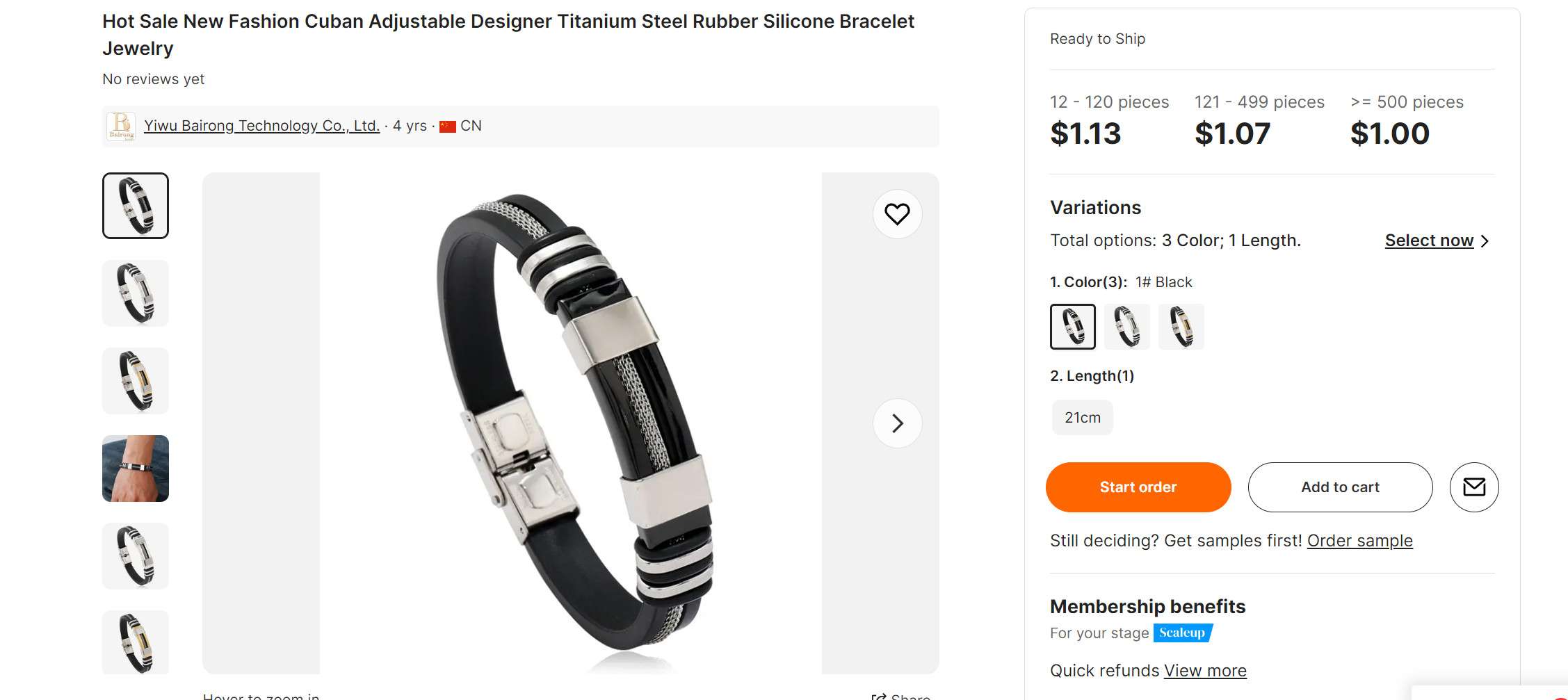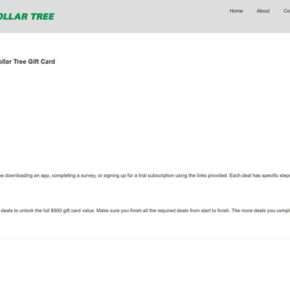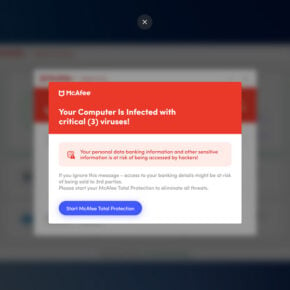Beware of online advertisements promoting an amazing LOVILDS “titanium ion wristband” that can supposedly help regulate blood sugar levels and reduce diabetes symptoms. Despite the bold claims and seemingly real customer reviews, the LOVILDS SugarFirm Elite TitanION Wristband is a complete scam designed to cheat consumers out of their hard-earned money.
- Overview of the Deceptive LOVILDS SugarFirm Elite TitanION Wristband Scam
- False Claims About the LOVILDS SugarFirm Elite TitanION Wristband
- Scammers Rebranding the Scam Product Under Various Names
- How the LOVILDS SugarFirm Elite TitanION Wristband Scam Unfolds
- What To Do If You Already Purchased The LOVILDS SugarFirm Elite
- Frequently Asked Questions About the LOVILDS SugarFirm TitanION Wristband Scam
- The Reality About the LOVILDS SugarFirm Elite TitanION Wristband
This in-depth article will uncover the deceptive tactics used to market this bogus diabetes wellness wristband online. We’ll break down the false claims in the ads, analyze the fake testimonials and non-existent “technology” behind it, and arm you with tips to protect yourself from this predatory scam.
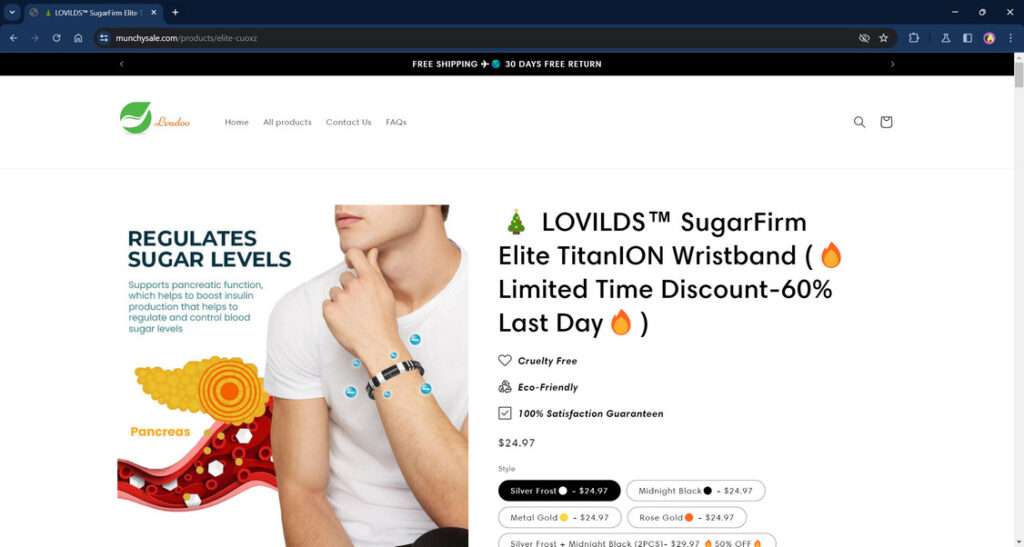
Overview of the Deceptive LOVILDS SugarFirm Elite TitanION Wristband Scam
The LOVILDS SugarFirm Elite TitanION Wristband scam operates through manipulative social media advertisements and fake product websites. Scammers are heavily promoting this bogus “titanium therapy” bracelet using exaggerated claims and ruses. But it does not provide any of the promised medical benefits for diabetes and blood sugar regulation.
This overview will analyze the various deceitful tactics used to dupe victims, including staged “demonstrations” of the wristband working, completely fabricated customer reviews and testimonials, false claims about “ION release technology”, manipulated before/after photos portraying fake results, and deceptive pricing strategies to maximize profits. We’ll examine how scammers fabricate serious medical conditions like diabetes to peddle cheap $1 wristbands online for up to $89. This despicable exploitation not only defrauds customers financially but also gives false hope about managing chronic illnesses.
The foundation of this scam involves creating polished video ads demonstrating the LOVILDS SugarFirm Elite bracelet “regulating blood sugar”. Dramatic footage shows glucose levels dropping on a monitoring device after putting on the wristband. This aims to hook people seeking diabetes relief. The ads also feature glowing testimonials from “verified purchasers” describing how the bracelet reduced their diabetes and high blood sugar symptoms. These include reviews like “My life is so much better after getting the LOVILDS SugarFirm Elite…it reduced my symptoms dramatically!”. These are totally invented to boost the bracelet’s credibility.
The ads portray the LOVILDS SugarFirm Elite as having near-magical healing powers. They claim it uses “TitanION technology” to release minerals that lower blood sugar, increase metabolism, improve circulation, provide anti-inflammatory benefits, and more. This is medical fiction – no proven nutrient therapy exists in a wristband. The scammers price the cheap $1 bracelets between $29 to $89 online. This huge markup allows them to profit enormously from the fictional health benefits described. Victims pay premium prices for a basic wristband they could buy on Alibaba for pennies.
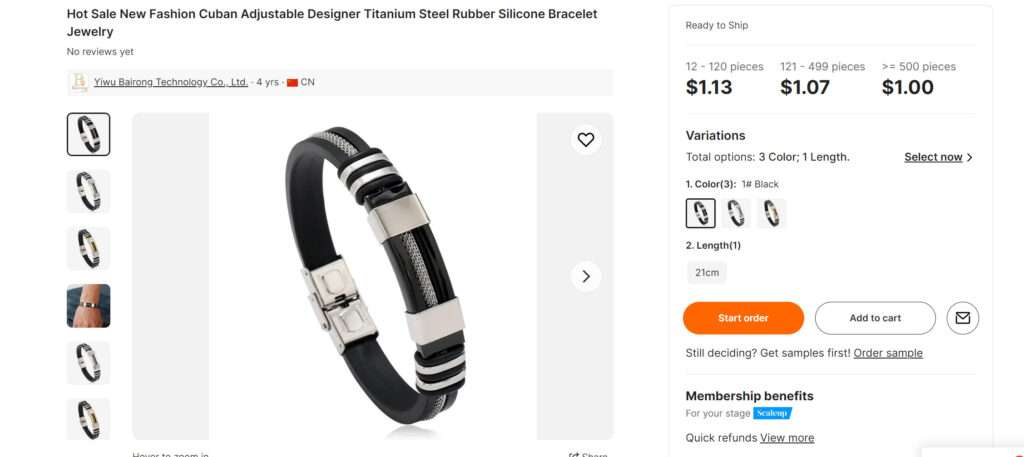
After collecting payments up to 89 times the manufacturing cost, the scammers ship $1 decorative wristbands to victims instead of the advertised medical device. They maximize profits through bold lies about diabetes relief. Only the scammers benefit financially from this heartless exploitation of chronic health conditions.
From fake testimonials to exaggerated capabilities, every aspect aims to mislead consumers. Avoid these vile scams by gaining knowledge about their dishonest tactics and false claims.
False Claims About the LOVILDS SugarFirm Elite TitanION Wristband
1. It releases titanium ions that regulate blood sugar levels
This is completely unfounded. There is no scientific evidence demonstrating that wearing a wristband can mysteriously release ions that control blood sugar. The wristband they send cannot alter blood chemistry or glucose metabolism.
2. The titanium ions improve insulin sensitivity
Again, no proof exists that dermal contact with a wristband can affect insulin or impact sensitivity. The product has no clinically demonstrated effect on insulin or diabetes symptoms.
3. It utilizes “advanced titanium ion technology”
This is technobabble with no real meaning. The cheap bracelet they send does not contain any advanced technology or release therapeutic ions.
4. It improves metabolism and blood flow
Wearing a wristband cannot inherently improve critical body functions like metabolism or circulation. This is an empty claim intended to mislead victims.
5. It reduces symptoms of diabetes
Total fiction. The plastic wristband has no capacity to relieve diabetes symptoms or manage this serious medical condition. Proper medication, diet and exercise are vital, not a $1 bracelet.
6. Testimonials show impressive health transformations
The glowing testimonials are completely fabricated. Any before/after photos are stock images or stolen from unrelated contexts. No real customers have experienced results.
7. Celebrity endorsements back the product
No celebrities have actually endorsed this cheap wristband. All endorsements are fake and unauthorized.
As you can see, the LOVILDS SugarFirm Elite TitanION Wristband relies on an arsenal of lies and deception. There is zero medical evidence that it can deliver on any of its lofty health promises. It is a fraud designed to exploit those struggling with diabetes and metabolic disorders.
Scammers Rebranding the Scam Product Under Various Names
Be aware that scammers are promoting the same worthless $1 wristbands using a variety of made-up brand names and labels. Some other scam brand names to watch out for include:
- Cuoxz SugarFirm Elite TitanION Wristband
- Oveallgo SugarFirm Elite TitanION Wristband
- South Korea SugarFirm TitanION Wristband
- Trabladzer Blood SugarFirm TitanION Wristband
- Gadgetbabes Blood SugarFirm TitanION Wristband
- Annaspick Blood SugarFirm TitanION Wristband
- Vantotolo Blood SugarFirm TitanION Wristband
Despite the different fictional company names used across the ads and websites, it is the exact same cheap decorative wristbands being shipped to victims. The variety of brand names allows the scammers to promote the same scam under different disguises.
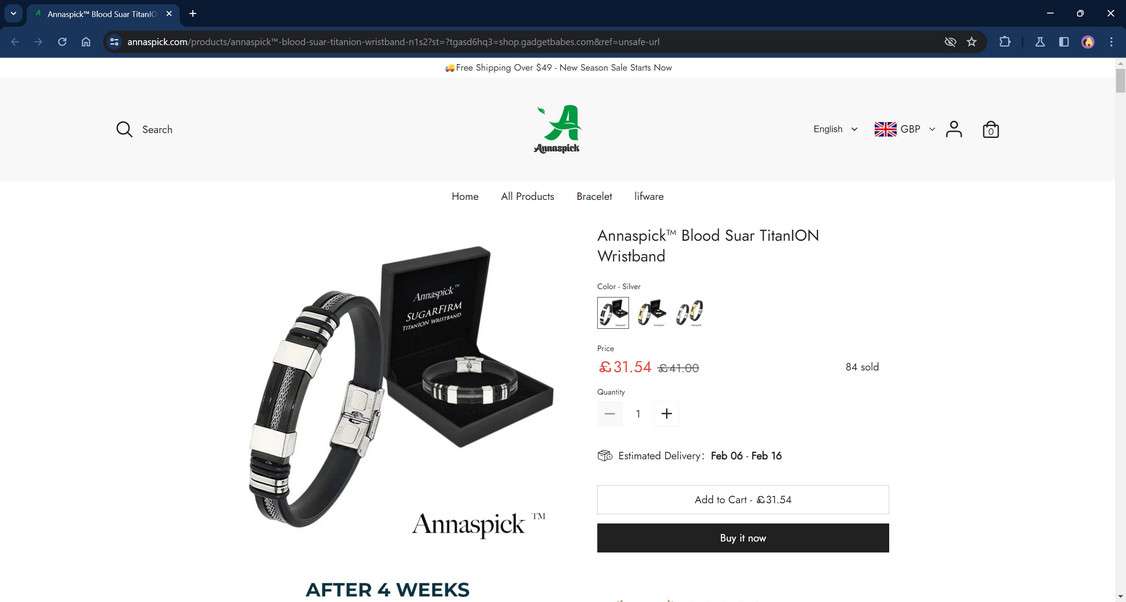
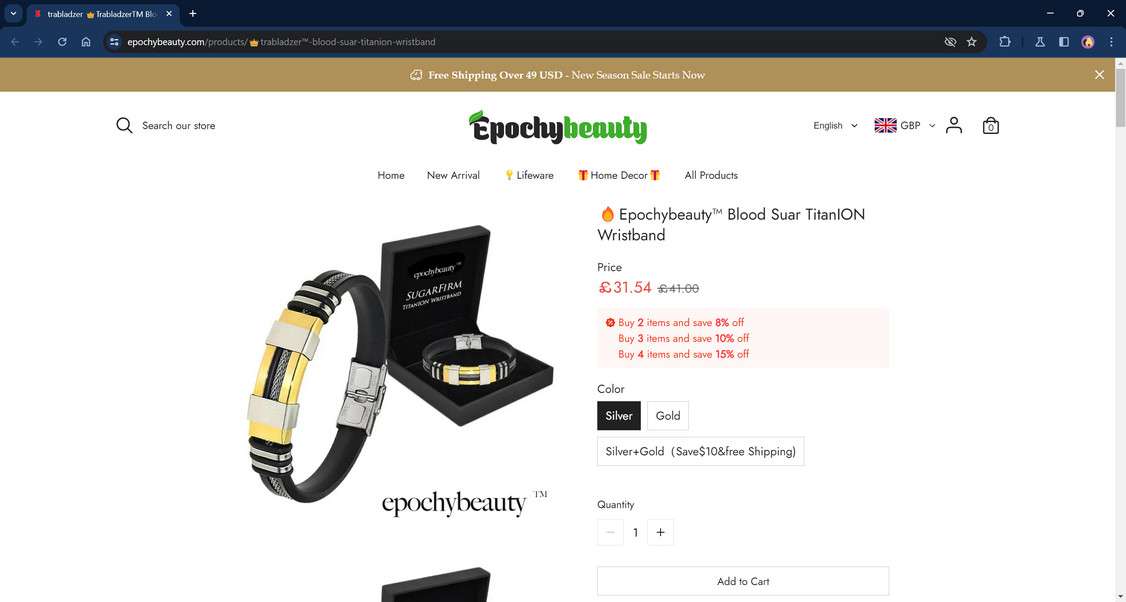
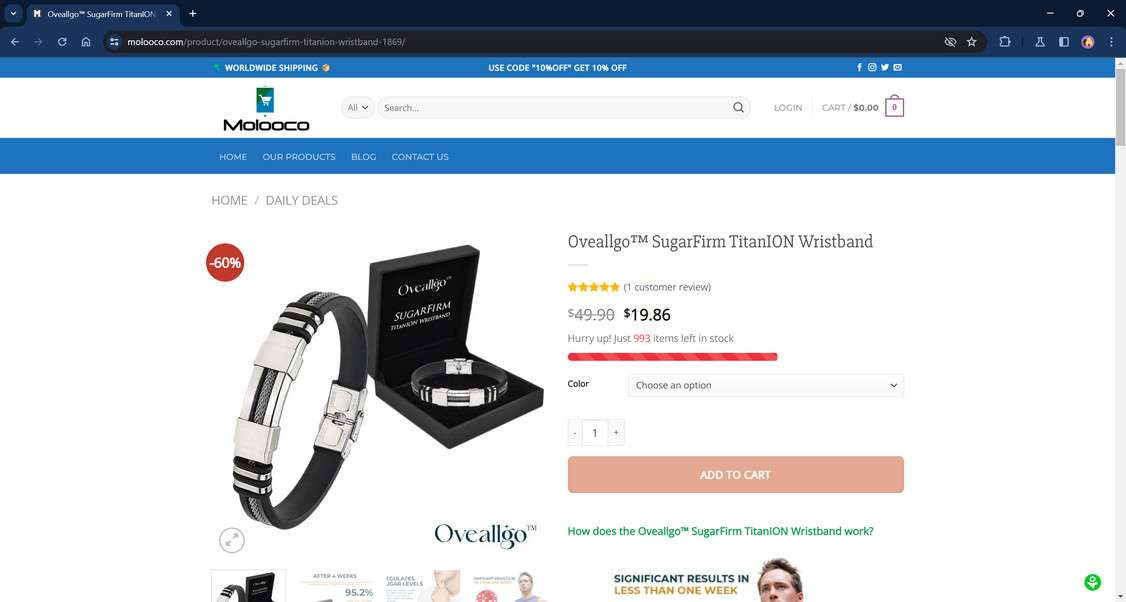

Do not be fooled if you see ads for supposed “TitanION therapy bracelets” using a name other than LOVILDS SugarFirm Elite. These all center around falsely advertising the same basic $1 wristbands and fabricated health claims. Stay vigilant against these attempts to rebrand the scam.
Let’s look closer at how this predatory diabetes health scam works to manipulate and mislead consumers.
How the LOVILDS SugarFirm Elite TitanION Wristband Scam Unfolds
The LOVILDS SugarFirm Elite scam follows a well-planned sequence to convince victims, collect payments, and evade responsibility. Here is an in-depth look at how this despicable health fraud scheme operates:
Step 1: Creating Sophisticated Video Ads
First, scam creators produce slick video promotions of the non-existent LOVILDS SugarFirm Elite bracelet using convincing scripts, stock footage, paid actors and other persuasive tactics. For example, a video may dramatically depict a man with diabetes thrilled as his glucose monitor level drops after putting on the bracelet. This aims to convince viewers the product works as advertised.
Step 2: Fabricating Glowing Customer Testimonials
Next, they invent raving testimonials from “verified buyers” who praise the impact of the LOVILDS SugarFirm Elite on reducing their diabetes symptoms and blood sugar levels. These include reviews describing specific details like:
“My fasting blood sugar used to be 175, now it’s down to 110 thanks to the LOVILDS SugarFirm Elite regulating it naturally overnight!”
Of course, these detailed reviews are totally fabricated to boost the bracelet’s credibility.
Step 3: Building Fake Ecommerce Websites
The scammers build legitimate-looking ecommerce sites advertising the LOVILDS SugarFirm Elite with checkout capabilities, pricing tiers, shipping details and more. This completes the illusion that the product is real and available for purchase.
Step 4: Promoting the Scam Ads on Social Media
The fake product ads get shared widely on Facebook, Instagram, Youtube etc. often using bots or paid promotion to boost their reach. The ads target users who may be concerned about diabetes management.
Step 5: Creating Urgency Around Limited Supplies
Scarcity and urgency tactics are used in the ads and websites, claiming only limited supplies left or a time-sensitive discount to pressure victims to purchase quickly before “missing out”.
Step 6: Collecting Payments from $29 to $89
Victims land on the slick ecommerce site and purchase the LOVILDS SugarFirm Elite, reassured by the demos and rave reviews. Scammers collect credit card payments ranging from $29 to $89.
Step 7: Shipping $1 Wristbands Instead of Product
To fulfill orders, scammers simply ship out basic $1 wristbands sourced in bulk from China to victims who paid premium prices, while keeping the difference as profit. Some victims may receive nothing at all.
Step 8: Disappearing Without a Trace
With profits collected, the scammers quickly take down the websites and vanish. They are ready to repeat the scam with a new domain and fake product to avoid being flagged.
As you can see, this is an intricately orchestrated fraud designed to fabricate credibility for a fictional product and capitalize on victims’ lack of medical knowledge. Outright lies about blood sugar regulation are used to financially exploit consumers. Only by understanding the deception from start to finish can consumers avoid falling for this or similar healthcare scams.
What To Do If You Already Purchased The LOVILDS SugarFirm Elite
If you have fallen prey to the predatory and dishonest marketing of the LOVILDS SugarFirm Elite TitanION Wristband scam, here are the steps you should take:
1. Report the deceptive ads to social media platforms. Alert Facebook, TikTok, YouTube, etc. about the scam so they can remove the listings. This will prevent others from being victimized.
2. Contact your credit card company or bank. Report the fraudulent charges and request a chargeback to recoup lost funds. Provide evidence showing the product is not as advertised.
3. File complaints with consumer protection groups. Submit scam reports to organizations like the FTC, state attorneys general, and the Better Business Bureau to trigger investigations against the scammers.
4. Warn others who may be at risk. Share your experience to prevent friends and family from being deceived. Post warnings about the scam online to expose the deception to potential victims searching for information.
5. Seek support for emotional distress. The trauma of being scammed can be significant. Seek help from mental health professionals if needed to process feelings of shame, anger or depression. You are not to blame – the scammers are.
6. Beware of recovery scams. Fraudsters sometimes approach past victims claiming they can help recover lost money for an upfront fee. Do not fall for these bogus offers of assistance.
7. Learn to identify similar scams moving forward. Use resources like the FTC to stay up to date on current online scams targeting diabetes patients and others.
The LOVILDS scam takes advantage of people struggling with diabetes and looking for solutions. By reporting the fraud, warning others and seeking recovery of lost funds, victims can take
Frequently Asked Questions About the LOVILDS SugarFirm TitanION Wristband Scam
Is the LOVILDS SugarFirm TitanION Wristband legit?
No, the LOVILDS SugarFirm TitanION Wristband is a scam. It is falsely advertised online as a medical device that can help regulate blood sugar levels, improve metabolism, and relieve diabetes symptoms. However, it does not actually have any of these capabilities. The wristband victims receive is simply a cheap decorative bracelet purchased in bulk from Chinese suppliers for around $1 per unit.
How does the LOVILDS SugarFirm TitanION Wristband scam work?
The scammers run ads on social media platforms like Facebook, Instagram, and YouTube featuring false claims about the medical capabilities of the wristband. These ads target people with diabetes using dubious testimonials and fake celebrity endorsements. Victims who order are sent cheap wristbands that have no actual effect on blood sugar or other health aspects.
What health claims do the scammers make about the LOVILDS SugarFirm TitanION Wristband?
The main false claims are that the wristband can release titanium ions that regulate blood sugar levels, improve metabolism and circulation, enhance insulin sensitivity, and relieve diabetes symptoms. The scammers refer to nonexistent “advanced titanium ion technology.” All of these assertions are medically unsupported.
What will I receive if I order the LOVILDS SugarFirm TitanION Wristband?
You will receive a basic, decorative wristband purchased wholesale from China for around $1 or less. It will be made of plastic or silicone and have no unique properties or “ion technology.” Some versions may have the LOVILDS name on them. But they are just cheap bands, not medical devices.
Are the testimonials used to promote LOVILDS SugarFirm TitanION Wristband real?
No, the glowing testimonials and impressive before/after photos used in the ads are completely fabricated. No real customers have experienced medical benefits from these cheap wristbands. All endorsements are fake.
Are celebrity endorsements used in LOVILDS SugarFirm ads real?
No. Scammers frequently use unauthorized celebrity images and fake endorsements to promote online scams. Celebrities have not backed this product. All celebrity endorsements are falsified.
I have diabetes. Will the LOVILDS SugarFirm TitanION Wristband help manage my symptoms?
No, there is no evidence this wristband provides any medical benefit for diabetes or blood sugar regulation. Proper medication, diet, and medical guidance from your physician are essential for managing diabetes – not this scam product.
Are there any risks to ordering the LOVILDS SugarFirm TitanION Wristband?
Yes. You will lose your money paying for a useless plastic wristband. More importantly, believing the scammers’ claims and relying on the wristband could dissuade people from seeking proper medical treatment, diet and lifestyle changes that are vital for managing diabetes. Delaying real treatment in favor of a scam product puts your health at serious risk.
What should I do if I already ordered the LOVILDS SugarFirm TitanION Wristband?
If you were already victimized, take these steps:
- Contact your credit card company and file a fraud complaint to initiate a chargeback. Provide proof the product is not as advertised.
- Report the deceptive ads and websites to social media companies like Facebook to get them taken down.
- File complaints with consumer protection agencies like the FTC and BBB to trigger investigations against the scammers.
- Warn friends and family about this scam so they don’t fall for the false claims.
- Seek emotional support and mental health assistance if you are experiencing trauma from being scammed.
- Do not fall for recovery scams claiming they can help for a fee. No one legitimate will request money to get your funds back.
- Learn to scrutinize claims about medical bracelets and other diabetes products promoted online.
How can I spot a diabetes-related product scam?
Here are red flags to watch for:
- Claims sound too good to be true (e.g. cures diabetes)
- High-pressure sales tactics and limited-time offers
- Claims the product works through means that aren’t scientifically proven
- Fake celebrity endorsements and implausible testimonials
- No contact information beyond a web form – no address/phone number
- Specious claims the product is selling out fast
- No refund policy or unsatisfactory refund terms
- Exorbitant price for what is shipped (cheap materials)
Are there any legitimate medical bracelets for diabetes?
While bracelets themselves have no medical capabilities, medical ID bracelets can help alert people to your diabetes condition in an emergency. However, legitimate companies will never claim a bracelet can actively treat or cure diabetes symptoms. Speak to your doctor about whether a medical ID bracelet is appropriate for your situation.
What precautions can I take to avoid diabetes-related scams?
- Be wary of miracle cure claims and testimonials that seem too amazing to be true.
- Check with your doctor before purchasing any medical product online.
- Research the company thoroughly and look for warnings and complaints.
- Avoid companies that appear suddenly on social media and claim limited supplies.
- Only purchase from reputable medical equipment companies with verifiable contact details.
- Carefully check refund and return policies before ordering.
- Never make payments via cryptocurrency – transactions can’t be reversed.
Are other diabetes products being used in scams too?
Yes, scammers are marketing a wide array of dubious pills, supplements, devices and other products online to diabetes patients using deceptive claims. Be very cautious when evaluating products that claim to cure, treat or manage diabetes symptoms. Consult your physician before trying any product advertised online. Legitimate medical treatments will not be marketed through aggressive social media ads or testimonials.
Stay vigilant and trust your healthcare providers when making decisions about managing your diabetes. Don’t become a victim to predatory online scams making unsupported medical assertions.
The Reality About the LOVILDS SugarFirm Elite TitanION Wristband
At the end of the day, the LOVILDS SugarFirm Elite bracelet does not actually contain any special “ion release technology” for blood sugar management or diabetes relief. No proven titanium therapy exists for these uses in a wristband.
The scammers completely fabricated the health claims in order to profit off desperate victims seeking solutions. In reality, it’s merely a $1 decorative wristband with no medical benefits. Don’t waste your money on this scheme.
Take control of your health by sticking to treatment plans from real doctors, not fantasy products pushed by scammers. Your best protection is staying vigilant against outlandish medical claims you encounter online.

